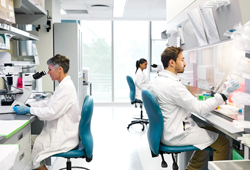Key Takeaways from Goodwin + KPMG @ JPMorgan Symposium: New Frontiers in Digital Diagnostics and MedTech
 On Wednesday, January 15, 2020, during the J.P. Morgan Healthcare conference, Goodwin and KPMG held their initial all-day Symposium at the St. Regis hotel in San Francisco. The Symposium was composed of five separate “bursts” entitled (i) New Frontiers in Digital Diagnostics and MedTech, (ii) Europe Unleashed, (iii) Knowing the Best IPO Strategy, (iv) Trends in Biopharma and (v) Mergers and Acquisitions. Stéphane Bancel, the Chief Executive Officer of Moderna Therapeutics, provided the keynote address.
On Wednesday, January 15, 2020, during the J.P. Morgan Healthcare conference, Goodwin and KPMG held their initial all-day Symposium at the St. Regis hotel in San Francisco. The Symposium was composed of five separate “bursts” entitled (i) New Frontiers in Digital Diagnostics and MedTech, (ii) Europe Unleashed, (iii) Knowing the Best IPO Strategy, (iv) Trends in Biopharma and (v) Mergers and Acquisitions. Stéphane Bancel, the Chief Executive Officer of Moderna Therapeutics, provided the keynote address.
Burst One consisted of three parts. Roger Cohen from Goodwin provided an overview of the current state of the healthcare sector and regulations. During this session, Roger provided an overview of the FDA’s definition of a medical device subject to FDA regulation, highlighting whether digital technologies would be encompassed within such definition. In addition, Roger reviewed other key federal and state laws of importance to companies involved in the digital healthcare space – including privacy laws such as HIPPA – and state laws regarding the corporate practice of medicine.
The second part of Burst One was a panel entitled “New Frontiers in MedTech Space on the Global Stage: What are the Challenges in IP, Regulatory and Commercial?” This panel was moderated by Kristin Ciriello Pothier from KPMG, and consisted of Nicholas Mitrokostas from Goodwin, Stefan Scherer from GlaxoSmithKline, Joseph Zaccaria from TrialSpark and Reena L. Pande from AbleTo. In this panel, participants provided their perspectives regarding the numerous challenges associated with bringing new medical technology to market, including as it relates to intellectual property, regulatory approvals, reimbursement and commercialization.
The final part of Burst One was a panel entitled “Issues Facing Therapeutic Companies Using ML and AI in Drug Discovery Methods.” This panel was moderated by Danielle Lauzon from Goodwin and consisted of David Berry from Flagship Pioneering, and Dan Housman from Graticule and Courage Therapeutics. In this panel, participants provided their insights regarding how artificial intelligence, or AI, and machine learning, or ML, is used in the drug development process, and debated what type of input data is necessary for AI and ML to be truly useful in the drug development process.
Key takeaways from Burst One were as follows:
- MedTech, digital diagnostic and health IT companies should seek guidance from experienced counsel as early on in the process as possible as laws and regulations are numerous and complicated. Various panel members noted that one of the biggest mistakes that companies in the evolving medtech, digital diagnostics and health IT spaces make is failure to consider the numerous, complicated laws and regulations that may apply to their technologies. Therefore, they highly recommended obtaining experienced lawyers early in the company lifecycle to avoid potential missteps. For example, determining whether certain medical software will be regulated as a medical device by the FDA is very fact intensive and requires input from an experienced regulatory specialist as there are dire consequences for making the wrong determination. In addition, it is important to note that these laws and regulations are constantly evolving, therefore, something that may be permissible today may not be permissible in the future. Experienced counsel can keep you up-to-date on pending developments that might affect your company.
- In many areas, the law has not kept pace with the speed of technological innovations; therefore, a great deal of gray space remains. Panelists noted that legal issues facing companies in rapidly-evolving sectors may not have a clear answer as the law has not kept pace with the speed of technological innovations. For example, in patent law, folks have had to consider whether a computer should be deemed the investor of the output from certain AI processes.
- In order for new technologies in areas such as medtech, healthcare IT and digital diagnostics to become successful on a large scale, there is a need to balance the innovative mindset with the entrenched mindset and there must be an openness to collaboration both internally and externally. Many panelists cautioned that in order for new innovations in medtech, digital diagnostics and healthcare IT to be accepted by the current healthcare system, it will require a great deal of cooperation between the innovators and the entrenched players. Therefore, panelists advised that companies developing new technologies in these areas should seek to involve more entrenched players into their decision-making and development process as early as possible, and to seek returns on a smaller scale before seeking returns on a larger scale in order to build credibility.
- AI has a great deal of promise in drug development, but questions remain regarding (i) how to obtain a sufficient amount of data for useful predictions, and (ii) the quality of the data that is used to arrive at predictions. Panelists noted that AI can be used throughout the drug development lifecycle, from assisting with target selection to helping predict the patient population that is most likely to respond to a product candidate. However, a panelist cautioned that the hype associated with AI should be toned down, as AI has yet to provide many of the promised benefits. Furthermore, there are many differing positions regarding the type of quality of data needed for AI to be truly useful in the drug development process.